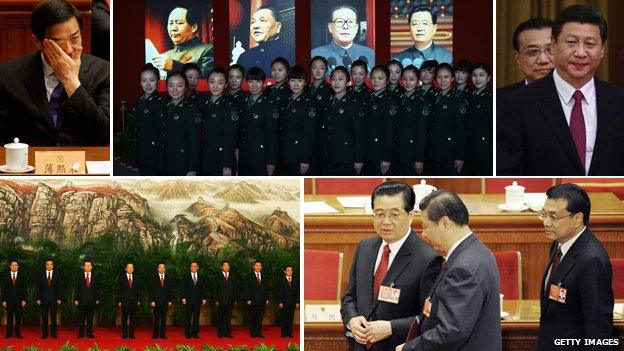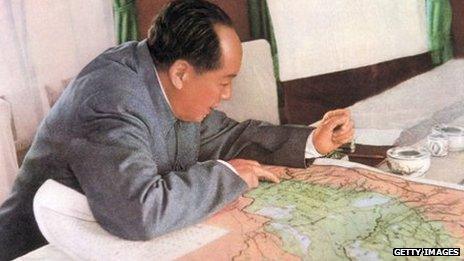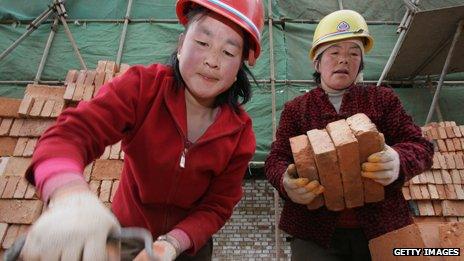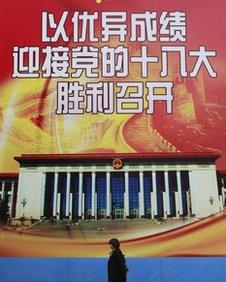Viewpoint: The powerful factions among China's rulers
- Published

China's political elite is dominated by two factions. But once the new leaders are unveiled, who will have the upper hand, and how will competing factions balance power? As part of a series on challenges for China's new leaders, political analyst Cheng Li says the country's future could be decided by a tussle at the top.
Of all the concerns about the forthcoming political succession in China, none may ultimately prove as important as whether or not the factional balance of power will be maintained.
China is now confronting widespread social unrest, slowing economic growth, increasing divisions within domestic public opinion on the issue of the country's political trajectory and rampant official corruption as revealed by the Bo Xilai scandal.
Any further signs of elite disunity or upsets in the factional balance of power within the top leadership could be overwhelmingly detrimental in terms of the continued rule of the Communist Party.
That is why the composition of the new Politburo Standing Committee (PSC), the supreme decision-making body in China, is critically important.
What will be the status of the competing factions in that committee? Will the existing system of collective leadership in China continue - or is it headed towards failure?
Populists vs princelings
China is a one-party state in which the Chinese Communist Party (CCP) monopolises power. The party leadership, however, is not a monolithic group. Its members do not all share the same ideology, political association, socio-economic background, or policy preferences.
In fact, two main political factions or coalitions within the CCP leadership are currently competing for power, influence and control over policy initiatives. This bifurcation has created within China's one-party polity something approximating a mechanism of checks and balances in the decision-making process.
This mechanism, of course, is not the kind of institutionalised system of checks and balances that operates between the executive, legislative and judicial branches in a democratic system.
But this new structure - sometimes referred to in China as "one party, two coalitions" - does represent a major departure from the "all-powerful strongman" model that was characteristic of politics in the Mao and Deng eras.

Solitary strongman: China's leadership these days is more about groups working together
One of the two intra-party groups in China is the "populist coalition", which is led by President Hu Jintao and Premier Wen Jiabao. The other is the "elitist coalition", which emerged in the Jiang Zemin era and used to be headed by Jiang but is currently led by both Wu Bangguo, chairman of the national legislature, and Jia Qinglin, head of a national political advisory body.
These four individuals - Mr Hu, Mr Wu, Mr Wen and Mr Jia - are currently China's top leaders. These two political camps share the seats in the top leadership organisations in a way as to reach a near-perfect balance.
The nine-member PSC, for example, has - at least prior to this 2012 Party Congress - maintained a four-to-five split, with four seats for the populist coalition and five going to the elitist coalition.
Xi Jinping and Li Keqiang, who will likely take over the top two posts at the 2012 Party Congress, each represent one of these two coalitions.
The two coalitions represent different socio-economic and geographical constituencies. Most of the top leaders in the elitist coalition, for instance, are "princelings", leaders who come from families of veteran revolutionaries or of high-ranking officials. These princelings often began their careers in the economically well-developed coastal cities. The elitist coalition usually represents the interests of China's entrepreneurs.
Most leading figures in the populist coalition, by contrast, come from less-privileged families. They also tend to have accumulated much of their leadership experience in the less-developed inland provinces.
Many advanced in politics by way of the Chinese Communist Youth League and have therefore garnered the label tuanpai, literally meaning "league faction". These populists often voice the concerns of vulnerable social groups, such as farmers, migrant workers and the urban poor.

The politicians on the "populist" side tend to emphasise the concerns of China's poorest: farmers and migrant workers, for example
Leaders of these two competing factions differ in expertise, credentials and experience. Yet they understand the need to compromise, the necessity of cutting deals, in order to co-exist - especially in times of crisis.
And there is a crisis going on now - one brought on by scandals among the factional leaders.
Threats to stability
The most serious one has centred on Bo Xilai, a prominent princeling. Another case is Ling Jihua, Hu Jintao's former chief of staff and up until recently a rising star in the tuanpai faction. Having become embroiled in a scandal of his own, Ling was appointed to a less important position on the eve of the Party Congress.
These scandals among factional leaders, however, can and should be easily dismissed. Factions themselves are too strong to be dismantled.
Factional tensions and dynamics now constitute the defining feature of Chinese elite politics. Outside analysts must develop a sophisticated understanding of Chinese factional politics, one that understands that Chinese leaders are not always mired in factional infighting.
In fact on most occasions and on many issues, they tend to co-operate. There is, at least for now, tremendous incentive among all senior leaders regardless of faction to unite under new party chief Xi Jinping to show elite cohesion and political solidarity.
Paradoxically, it is also in the interest of both factions to have the existing balance of power remain intact (a three-to-four split assuming the new committee will consist of seven members). The overall balance of power should also take into consideration the composition of the full Politburo and the Central Military Commission, including whether or not Hu Jintao steps down as the chairman of the powerful military commission at the Party Congress.
But recent rumours hold that the factional split in the new standing committee will shift to two-to-five (two tuanpai versus five princelings or protégés of Jiang). If true, this could be highly problematic. If the factional balance is not maintained, the defeated faction would likely use its political resources and socio-economic constituencies to undermine the legitimacy of the political system, which in turn would threaten the stability of the country at large.
Even if the current balance of power remains, China's emerging "bipartisanship" is still at risk of failure. Deal-cutting, power-sharing and political compromise is not always easy. The fact that there are more ambitious candidates than available seats may naturally create a sense of winners and losers.
Controversy concerning personnel appointments, especially when it comes to membership in the Politburo and PSC, could become viciously contentious, leading factional infighting to spiral out of control.
In addition, conflicts of interests and disputes over policies - including distribution of resources, financial reforms, rural land reforms, public health and social welfare reform, affordable urban housing initiatives, anti-corruption mechanisms and other political and judicial reforms - could prove so controversial that the new leadership may find it increasingly difficult to build the kind of consensus necessary to govern effectively.

By the time of the 18th National Congress the leadership will largely be decided
A frequent criticism of Chinese collective leadership found both in China and abroad is that this new political structure tends to make the decision-making process lengthier and more complicated, often resulting in deadlock.
Top leaders, most noticeably President Hu and Premier Wen, sometimes proved themselves unable to effect initiatives or policy decisions due to resistance from other members of the standing committee. Critics fear that soon-to-be President Xi Jinping and Premier Li Keqiang will face even tougher obstacles due to both the competitiveness of their peers and increasing institutional constraints.
Chinese-style democracy?
One may argue, however, that it is neither feasible nor desirable for China to return to the era of strongman politics. Only if China actually went to war or experienced prolonged domestic chaos might a political environment emerge in which a strong leader - possibly an egoistic and ultra-nationalistic demagogue like Bo wished to be - come to the fore.
The choice, of course, should not be just between an ineffective collective leadership on the one hand or an effective but dangerous dictator on the other. China's "one party, two coalitions" experiment, despite its limitations, may gradually overcome the system's deficiencies, thus paving the way for a systemic transition to a Chinese style of democracy.
At this week's Party Congress, the leadership must find a way to guarantee the strong administrative power and political authority for Xi Jinping, the first among equals, and to prevent retired top leaders (namely Jiang and Hu) from interfering in the decision-making process.
The widely speculated downsizing of the PSC from nine seats to seven is significant on two counts. First, this move will likely eliminate two specific positions - the propaganda czar and the police czar - that have constituted the main obstacles to economic liberalisation and political reform. Second, this smaller size will likely enhance the top leader's power.
More importantly, given the deep legitimacy crisis facing communist rule and the growing public resentment of nepotism and patron-client ties in the selection of leaders, the authorities should adopt more mechanisms for intra-party elections.
The full Central Committee can elect seven from the eight candidates on the ballot for the standing committee, which will in fact not change the factional balance of power (as four candidates can be chosen from each camp). Or alternatively, the full Central Committee can elect the 25-member Politburo with more candidates on the ballot. The intra-party election in this highest level of leadership can build a new source of legitimacy and mandate for new leaders.
Success or failure, China's collective leadership and its factional dynamics will have a major impact on how the most populous country in the world will be governed in the years to come.